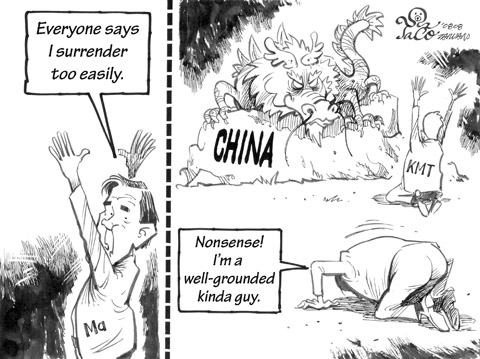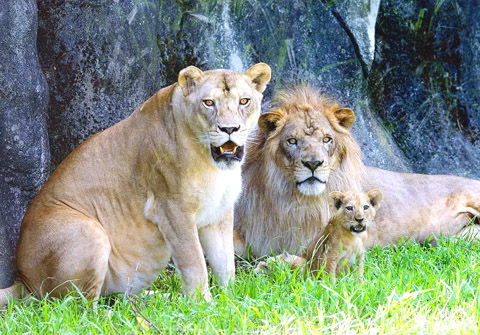DPP sues Ma
for declassifying files
‘Treason’: The caucus said that declassifying files related to the ‘state
affairs fund’ case could put the lives of security agents and diplomatic affairs
at risk
Saturday, Aug 09, 2008, Page 1
“We are not suing Ma to seek payback for Chen; we are suing Ma to uphold the
nation’s legal system as well as to defend national security.” — Ker Chien-ming,
Democrative Progressive Party caucus whip
By Meggie Lu Staff Reporter, with CNA The Democratic Progressive Party (DPP)
caucus yesterday filed a lawsuit against President Ma Ying-jeou (馬英九), accusing
Ma of treason over his decision to declassify documents related to former
president Chen Shui-bian’s (陳水扁) “state affairs fund” case.
The Presidential Office announced on Wednesday that it was opening the files,
but said that it was not an act to “declassify” the documents but to “revoke the
earlier classification” by the Chen administration.
DPP caucus whip Ker Chien-ming (柯建銘) yesterday slammed the Presidential Office’s
move, saying the declassification would reveal previously confidential
information, “such as the names of national security agents and the nation’s
dealings with foreign countries.”
“We are not suing Ma to seek payback for Chen; we are suing Ma to uphold the
nation’s legal system as well as to defend national security,” said Ker, who led
several DPP legislators to the Taipei District Court to file the lawsuit.
“[If we were to open classified documents], who in the future would risk their
necks and serve as agents, only to be sold out by his or her own country later?”
Ker said.
At issue are files held by the Taipei District Court as evidence in the “state
affairs fund” case, in which Chen was named a co-defendant as soon as he stepped
down from the presidency on May 20.
The prosecution named Chen a “joint perpetrator,” while indicting his wife, Wu
Shu-jen (吳淑珍), for corruption and forgery on Nov. 3, 2006, after determining she
had used receipts provided by others to claim reimbursements totaling NT$14.8
million (US$450,000) from the president’s “state affairs fund” between July 2002
and March 2006.
Chen said that none of the money went into his own pocket, contending that the
confusing accounting system governing Presidential Office expenses made it
necessary to use outside receipts to obtain money from the discretionary fund to
finance secret diplomatic missions abroad.
However, the Taipei District Court ruled on Jan. 19 last year that the six
diplomatic missions cited by Chen were not secret as the president claimed and
should be disclosed in court proceedings.
Last September, Chen proclaimed the files held by the court as “strictly
confidential” and petitioned the court to return them to the Presidential
Office.
After his request was turned down by the district court, Chen appealed to the
Taiwan High Court and later to the Supreme Court, which has not ruled on the
appeal.
The process has since stalled the district court proceedings on the embezzlement
case.
Large US
congressional delegation to arrive today
FACT-FINDING TRIP: A 27-member group of a US House aviation subcommittee is
seeking to learn more about Taiwan’s approach to aircraft maintenance and
security
Saturday, Aug 09, 2008, Page 3
By Jenny W. Hsu Staff Reporter The largest US congressional delegation to visit
Taiwan since 2003 is scheduled to arrive today for a three-day fact-finding
trip.
The Ministry of Foreign Affairs and the American Institute in Taiwan (AIT) said
yesterday a 27-member group from the Aviation Subcommittee under the US House
Transportation and Infrastructures Committee would use a special military flight
for the visit to Taiwan.
The delegation is scheduled to meet with several high-ranking officials,
including President Ma Ying-jeou (馬英九), Premier Liu Chao-shiuan (劉兆玄), Minister
of Foreign Affairs Francisco Ou (歐鴻鍊) and Minister of Transportation and
Communications Mao Chi-kuo (毛治國).
The AIT said in a press release Taiwan was the group’s last stop on a
fact-finding trip that also included Singapore and Vietnam. The purpose of the
trip is for the delegates to familiarize themselves with Taiwan’s commercial
aircraft maintenance facilities and its policies and methods for preventing
terrorist attacks on harbors and airports.
A press release from the Taipei Economic and Culture Representative Office said
many US citizens in the aviation maintenance industry had lost jobs as a result
of overseas outsourcing, and that the delegation hoped the trip could give
members a better understanding of the situation.
The delegation is led by Democratic Representative Jerry Costello, chairman of
the Subcommittee on Aviation. Delegation members include Republican
representatives John Duncan, Henry Brown and Mary Fallin and Democratic
representatives Solomon Ortiz, Tim Holden, Eddie Bernice Johnson, Michael
Capuano and Dan Lipinski.
The group is scheduled to visit Evergreen Aviation Technologies Corp, the
National Palace Museum, Taipei 101 and the Taiwan High Speed Rail Corp.
They are booked to arrive at Taipei Sungshan Airport today and depart on Monday.
The Ministry of Foreign Affairs said Ou would receive the delegation at a lunch
banquet at the Taipei Guest House on Monday.
Additional reporting by CNA
Economic
warnings amid the Olympics
By Paul Lin林保華
Saturday, Aug 09, 2008, Page 8
The Chinese government has created a “White Terror” for the Beijing Olympics in
vigorously suppressing political dissidents.
In an interview with international media last Friday, Chinese President Hu
Jintao (胡錦濤) was quoted as saying that “Hosting the Olympic games undoubtedly
has boosted Beijing’s economy. But due to the fact that the economic aggregate
of Beijing only accounts for a minimal portion of that of the entire nation, the
contribution of hosting the Olympic games to the nation’s economic development
should not be overestimated.”
Commenting on economic policy, Hu said that “maintaining steady and relatively
fast economic development and preventing commodity prices from rising too
sharply are the top priorities for macro-control.”
The Olympics are a huge political and economic event for all of China. But Hu
has said the Games have nothing to do with politics and will only boost
Beijing’s economy.
Why would he suddenly become so modest, trying to turn a national event into a
local one?
Olympics-related stocks have been sizzling not only on the Chinese stock market
but also in Hong Kong and Taiwan. Have they now been turned into shares gaining
from a local event?
Hu’s remarks reflect the fact that hopes for an improved economy following the
Olympics have been shattered. The Olympics will not only be a money-losing
business, but China’s economy could suffer from them as well.
Expenditure on the Olympics is a state secret. It was estimated that the cost of
building the stadiums would be US$37 billion, but the true figure has kept
increasing. When Hu took office in 2003 some spending cuts were made, but it is
almost certain now that the final cost will greatly exceed the original
estimate, especially given the price of raw materials.
The government has cited a figure based on expert analysis that the Olympics are
expected to bring in total revenue of US$70 billion. The question that follows
is: How much will China have spent on nationwide anti-terrorism security
measures, efforts to resolve air pollution, shutting down hundreds of factories
and commercial losses from an expected 50 percent drop in foreign tourist
arrivals, not to mention depressed business because of various local
restrictions? Even stores in the Shanghai subway have closed for a month.
The problem is that there are signs of crisis in the economy. Not only have
businesspeople from Taiwan, Hong Kong and South Korea started to leave, a survey
on the competitiveness of manufacturing by US consultants Booz Allen Hamilton
and the American Chamber of Commerce in Shanghai also indicates that about 20
percent of multinational enterprises have thought about withdrawing altogether.
Statistics also show that growth in China’s foreign trade surplus and foreign
investment has decreased. Last month, Chinese Premier Wen Jiabao (溫家寶), Vice
President Xi Jinping (習近平), Executive Vice Premier Li Keqiang (李克強) and Vice
Premier Wang Qishan (王歧山) inspected five developed provinces focusing on foreign
trade — only to realize that a large number of firms had closed down.
Later that month, the Chinese Central Economic Work Conference in Beijing
changed the thrust of economic policy from “preventing the economy from
overheating and overall inflation” to “maintaining steady and relatively fast
economic development in the long run as well as keeping rising consumer prices
within a bearable range based on economic and social development.”
In other words, the central bank is relaxing monetary policy because
unemployment is more detrimental to economic stability than inflation.
Nevertheless, the Chinese stock market continues to flounder.
Can the Taiwanese economy really rely on this “clay Buddha”?
Paul Lin is a political commentator.
Translated by Ted Yang


FAMILY PRIDE
A pair of African lions and their newborn female cub rest at Taipei Zoo
yesterday.
PHOTO: CNA